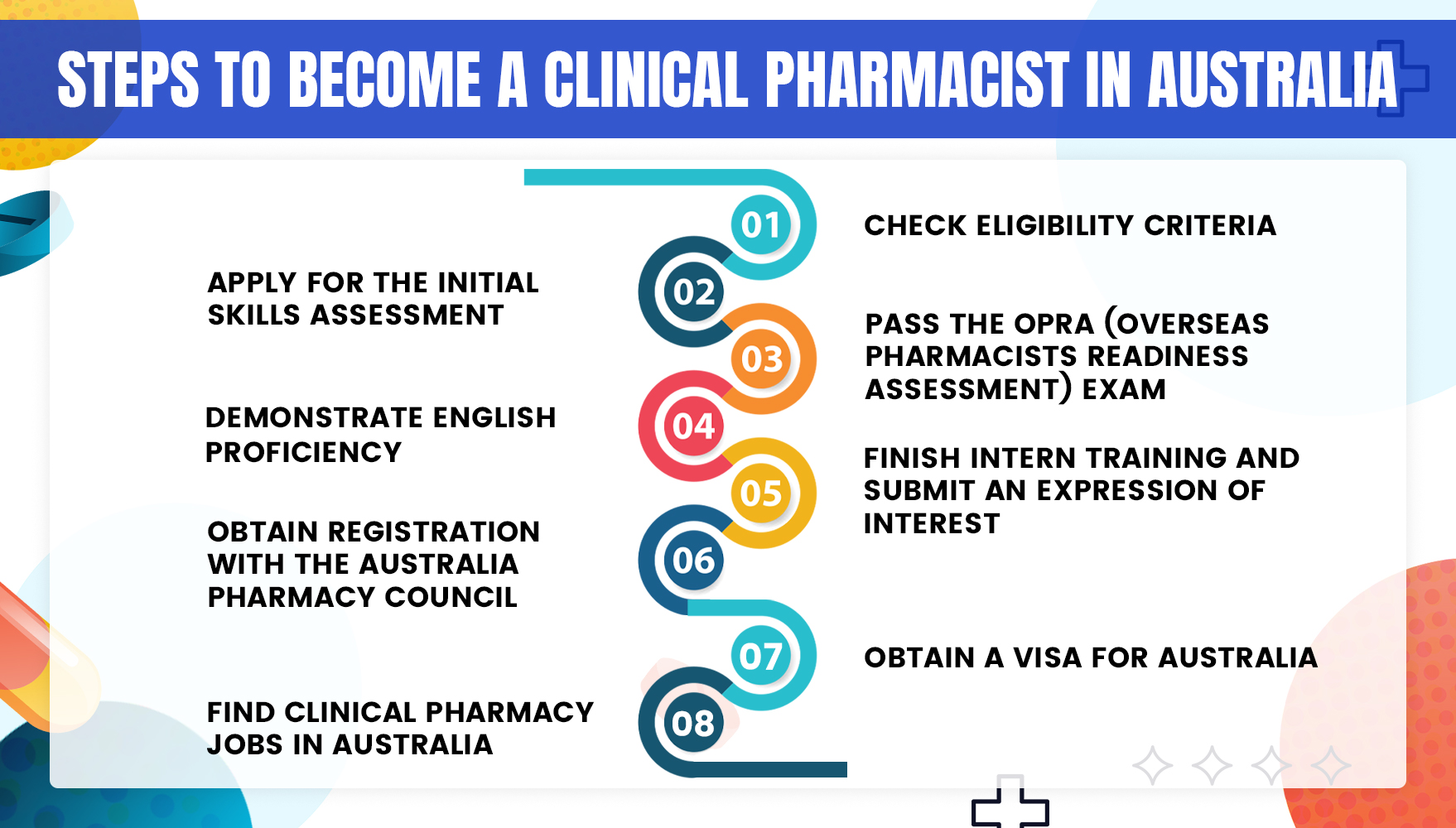Role of a Clinical Pharmacist
A Clinical Pharmacist works directly with doctors and patients in healthcare settings. They focus on optimizing patient drug therapy. They also review prescriptions and outcomes.
Here are a few responsibilities of a clinical pharmacist:
- Patient medication review:
- Assess the medication prescribed to the patient
- Identify issues such as possible drug interactions.
- Adjusting dosages with physicians:
- Adjust the dose in consultation with the prescribing physician.
- Counselling on side effects and drug interactions:
- Educate the patients on the possible side effects of the drug.
- Participation in ward rounds:
- Participate in ward rounds
- Learn the patient’s medical history.
- Improve communication between patients and healthcare service providers
Step-by-Step Guide To Becoming a Clinical Pharmacist in Australia
To become a clinical pharmacist in Australia, candidates have to pass the Australian Pharmacy Council assessment. This evaluates whether the skills and knowledge are comparable to the Australian standards.
This test is known as the Overseas Pharmacists Readiness Assessment exam.

Here are the steps for getting registered as a pharmacist with the Pharmacy Board of Australia.
1. Eligibility Check
- Educational Qualifications: Candidates must hold a pharmacy degree from a recognized institution. It can be B.Pharm or a PharmD degree.
- Professional Registration: Candidates should be actively registered as a pharmacist in their home country. Or they should be eligible to register.
Also Read: OPRA Exam Eligibility
2. Initial Skills Assessment
The Initial Skills Assessment conducted by the APC confirms that the overseas pharmacy education and experience are equivalent to Australian standards. This assessment involves:
- Degree Verification: BPharm or PharmD degree and transcripts.
- Registration Proof: Valid registration license in the home country.
- Identification: Valid passport or government ID.
- Work Experience: Documentation of professional experience (if applicable)
3. Pass the OPRA (Overseas Pharmacists Readiness Assessment) Exam
After your qualifications are approved, the next step is to pass the OPRA exam. This exam is crucial for overseas-trained pharmacists and covers:
- Biomedical Sciences
- Medical Chemistry
- Pharmacokinetics and Pharmacodynamics
- Pharmacology and Toxicology
- Therapeutics and Patient Care
Some of the OPRA exam particulars are:
- Duration of Exam: 2.5 Hrs
- Number of Questions: 120
- Mode of Exam: CAT MCQ (Online)
- Exam Fee: $2190 AUD (INR 120,450)
- Test Center: Worldwide
The exam results are released 4 weeks after the exam.
Also Read: OPRA Exam Syllabus
4. English Language Proficiency
The Pharmacy Board of Australia requires candidates to be proficient in the English language. For this, candidates may take either of the two English language proficiency tests:
- IELTS: Overall score of 7.5 (no band lower than 7).
- OET: Score of at least 7 in each section.
5. Finish Intern Training and Submit an Expression of Interest(EOI)
Apply for internship positions with the provisional registration license. The internship period is 6 months.
After completing 75% of the internship period, apply for the Intern Written Exam.
Lastly, clear the oral assessment after completing the internship.
6. Obtain Registration with the Australian Pharmacy Council
Candidates can apply for full registration with the PBA on successful completion of the oral assessment.
7. Obtain a Visa for Australia
A valid visa is required to work in Australia. There are various visa subclasses to choose from, depending on the specific requirements.
8. Find Clinical Pharmacy Jobs in Australia
Once registration is complete, you can begin your job hunt. Clinical pharmacists work in hospitals and healthcare establishments. One can more easily secure a job in rural areas in Australia due to the shortage of skilled clinical pharmacists.
Clinical Pharmacist in Australia- Benefits
There are many benefits for clinical pharmacists in Australia. A few of them are listed here:
- High Salaries: The higher salary brackets of 100,000 AUD (approximately 55 lakhs INR) and 130,000 AUD (approximately 70 lakhs INR) are alluring. One can lead a comfortable lifestyle even in big cities.
- Career Growth: Australia offers a great platform for advancing your career. With multiple career roles and world-class facilities, many opportunities are available for career growth.
- Work-Life Balance: Australia places great emphasis on achieving a balanced work-life balance. This is translated into its work culture as well.
- High Demand: There is a high demand for clinical pharmacists in small towns and rural areas.
- Ease of Visa: The Australian government has introduced several schemes to benefit skilled workers. The skilled worker visa is one of them. With relevant skills, it has become easier to obtain a visa in Australia.
Also Read: How To Become A Retail Pharmacist In Australia
Final Thoughts
The path to becoming a registered pharmacist in Australia for overseas pharmacists is highly rewarding. The process has been significantly simplified over the years, thanks to numerous government incentives.
A career as a clinical pharmacist is both fulfilling and rewarding. The high salaries, great infrastructure, and lifestyle all make Australia the place to be.
For personalised guidance and support, consider joining an OPRA Exam Coaching Online. Fulfil your dream of becoming a clinical pharmacist in Australia with Academically today and consult with experts by filling out this form.






